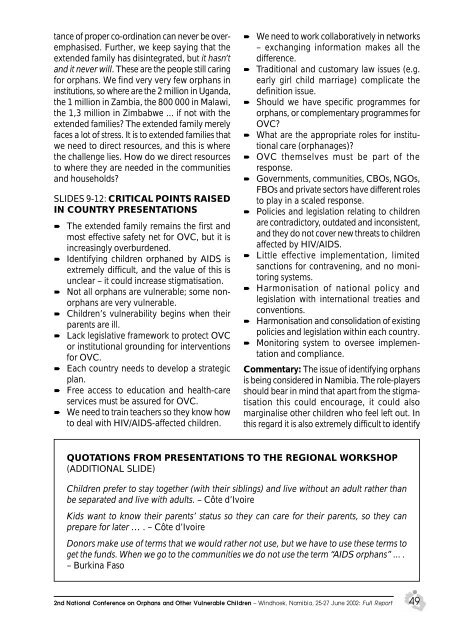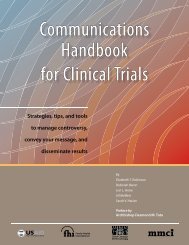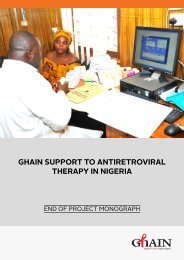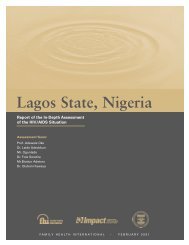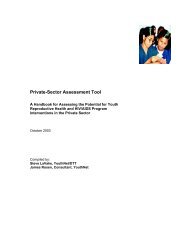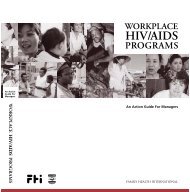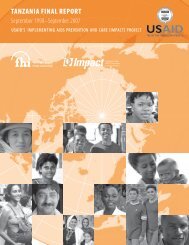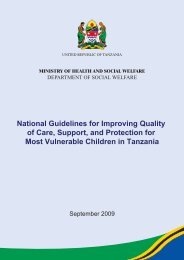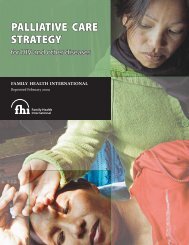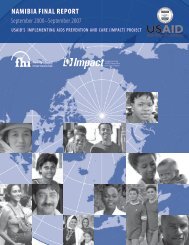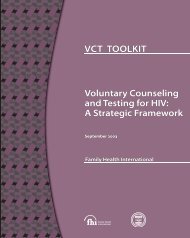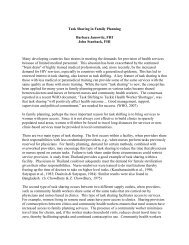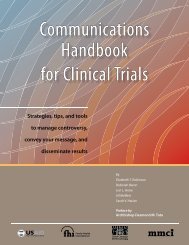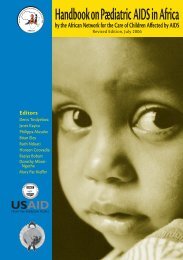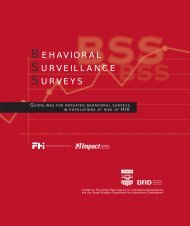2nd National Conference on Orphans and Other ... - FHI 360
2nd National Conference on Orphans and Other ... - FHI 360
2nd National Conference on Orphans and Other ... - FHI 360
Create successful ePaper yourself
Turn your PDF publications into a flip-book with our unique Google optimized e-Paper software.
tance of proper co-ordinati<strong>on</strong> can never be overemphasised.<br />
Further, we keep saying that the<br />
extended family has disintegrated, but it hasn’t<br />
<strong>and</strong> it never will. These are the people still caring<br />
for orphans. We find very very few orphans in<br />
instituti<strong>on</strong>s, so where are the 2 milli<strong>on</strong> in Ug<strong>and</strong>a,<br />
the 1 milli<strong>on</strong> in Zambia, the 800 000 in Malawi,<br />
the 1,3 milli<strong>on</strong> in Zimbabwe ... if not with the<br />
extended families? The extended family merely<br />
faces a lot of stress. It is to extended families that<br />
we need to direct resources, <strong>and</strong> this is where<br />
the challenge lies. How do we direct resources<br />
to where they are needed in the communities<br />
<strong>and</strong> households?<br />
SLIDES 9-12: CRITICAL POINTS RAISED<br />
IN COUNTRY PRESENTATIONS<br />
The extended family remains the first <strong>and</strong><br />
most effective safety net for OVC, but it is<br />
increasingly overburdened.<br />
Identifying children orphaned by AIDS is<br />
extremely difficult, <strong>and</strong> the value of this is<br />
unclear – it could increase stigmatisati<strong>on</strong>.<br />
Not all orphans are vulnerable; some n<strong>on</strong>orphans<br />
are very vulnerable.<br />
Children’s vulnerability begins when their<br />
parents are ill.<br />
Lack legislative framework to protect OVC<br />
or instituti<strong>on</strong>al grounding for interventi<strong>on</strong>s<br />
for OVC.<br />
Each country needs to develop a strategic<br />
plan.<br />
Free access to educati<strong>on</strong> <strong>and</strong> health-care<br />
services must be assured for OVC.<br />
We need to train teachers so they know how<br />
to deal with HIV/AIDS-affected children.<br />
We need to work collaboratively in networks<br />
– exchanging informati<strong>on</strong> makes all the<br />
difference.<br />
Traditi<strong>on</strong>al <strong>and</strong> customary law issues (e.g.<br />
early girl child marriage) complicate the<br />
definiti<strong>on</strong> issue.<br />
Should we have specific programmes for<br />
orphans, or complementary programmes for<br />
OVC?<br />
What are the appropriate roles for instituti<strong>on</strong>al<br />
care (orphanages)?<br />
OVC themselves must be part of the<br />
resp<strong>on</strong>se.<br />
Governments, communities, CBOs, NGOs,<br />
FBOs <strong>and</strong> private sectors have different roles<br />
to play in a scaled resp<strong>on</strong>se.<br />
Policies <strong>and</strong> legislati<strong>on</strong> relating to children<br />
are c<strong>on</strong>tradictory, outdated <strong>and</strong> inc<strong>on</strong>sistent,<br />
<strong>and</strong> they do not cover new threats to children<br />
affected by HIV/AIDS.<br />
Little effective implementati<strong>on</strong>, limited<br />
sancti<strong>on</strong>s for c<strong>on</strong>travening, <strong>and</strong> no m<strong>on</strong>itoring<br />
systems.<br />
Harm<strong>on</strong>isati<strong>on</strong> of nati<strong>on</strong>al policy <strong>and</strong><br />
legislati<strong>on</strong> with internati<strong>on</strong>al treaties <strong>and</strong><br />
c<strong>on</strong>venti<strong>on</strong>s.<br />
Harm<strong>on</strong>isati<strong>on</strong> <strong>and</strong> c<strong>on</strong>solidati<strong>on</strong> of existing<br />
policies <strong>and</strong> legislati<strong>on</strong> within each country.<br />
M<strong>on</strong>itoring system to oversee implementati<strong>on</strong><br />
<strong>and</strong> compliance.<br />
Commentary: The issue of identifying orphans<br />
is being c<strong>on</strong>sidered in Namibia. The role-players<br />
should bear in mind that apart from the stigmatisati<strong>on</strong><br />
this could encourage, it could also<br />
marginalise other children who feel left out. In<br />
this regard it is also extremely difficult to identify<br />
QUOTATIONS FROM PRESENTATIONS TO THE REGIONAL WORKSHOP<br />
(ADDITIONAL SLIDE)<br />
Children prefer to stay together (with their siblings) <strong>and</strong> live without an adult rather than<br />
be separated <strong>and</strong> live with adults. – Côte d’Ivoire<br />
Kids want to know their parents’ status so they can care for their parents, so they can<br />
prepare for later … . – Côte d’Ivoire<br />
D<strong>on</strong>ors make use of terms that we would rather not use, but we have to use these terms to<br />
get the funds. When we go to the communities we do not use the term “AIDS orphans” ... .<br />
– Burkina Faso<br />
<str<strong>on</strong>g>2nd</str<strong>on</strong>g> <str<strong>on</strong>g>Nati<strong>on</strong>al</str<strong>on</strong>g> <str<strong>on</strong>g>C<strong>on</strong>ference</str<strong>on</strong>g> <strong>on</strong> <strong>Orphans</strong> <strong>and</strong> <strong>Other</strong> Vulnerable Children – Windhoek, Namibia, 25-27 June 2002: Full Report<br />
49


